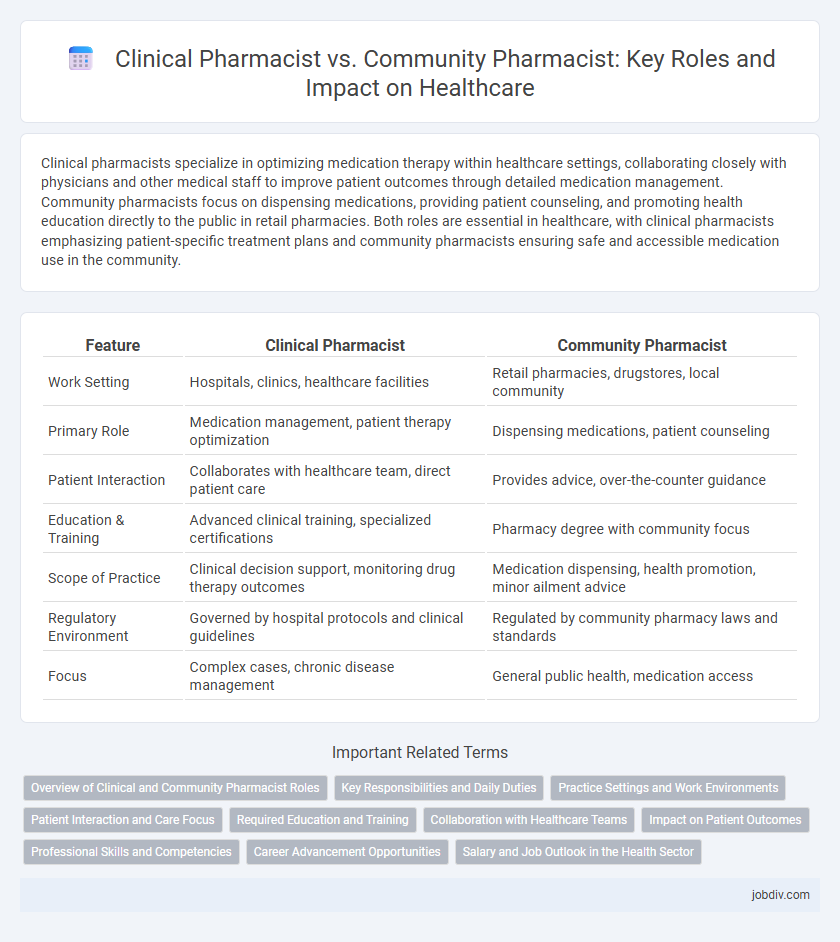Clinical pharmacists specialize in optimizing medication therapy within healthcare settings, collaborating closely with physicians and other medical staff to improve patient outcomes through detailed medication management. Community pharmacists focus on dispensing medications, providing patient counseling, and promoting health education directly to the public in retail pharmacies. Both roles are essential in healthcare, with clinical pharmacists emphasizing patient-specific treatment plans and community pharmacists ensuring safe and accessible medication use in the community.
Table of Comparison
| Feature | Clinical Pharmacist | Community Pharmacist |
|---|---|---|
| Work Setting | Hospitals, clinics, healthcare facilities | Retail pharmacies, drugstores, local community |
| Primary Role | Medication management, patient therapy optimization | Dispensing medications, patient counseling |
| Patient Interaction | Collaborates with healthcare team, direct patient care | Provides advice, over-the-counter guidance |
| Education & Training | Advanced clinical training, specialized certifications | Pharmacy degree with community focus |
| Scope of Practice | Clinical decision support, monitoring drug therapy outcomes | Medication dispensing, health promotion, minor ailment advice |
| Regulatory Environment | Governed by hospital protocols and clinical guidelines | Regulated by community pharmacy laws and standards |
| Focus | Complex cases, chronic disease management | General public health, medication access |
Overview of Clinical and Community Pharmacist Roles
Clinical pharmacists specialize in direct patient care within healthcare settings, collaborating with physicians to optimize medication therapy and ensure safe, effective drug use. Community pharmacists focus on dispensing medications, providing medication counseling, and promoting health education in retail or community pharmacies. Both roles play critical parts in healthcare but differ primarily in patient interaction environments and responsibilities related to medication management.
Key Responsibilities and Daily Duties
Clinical pharmacists specialize in optimizing medication therapy in healthcare settings, collaborating with doctors to tailor drug regimens based on patient-specific factors. Community pharmacists focus on dispensing prescriptions, counseling patients on over-the-counter medications, and managing medication adherence in retail environments. Daily duties of clinical pharmacists include medication review and clinical interventions, while community pharmacists handle prescription filling, health screenings, and patient education.
Practice Settings and Work Environments
Clinical pharmacists primarily work in hospital or healthcare settings, collaborating closely with medical teams to optimize patient medication therapy and ensure safety. Community pharmacists operate in retail pharmacies or community health centers, providing direct patient counseling, medication dispensing, and over-the-counter drug advice. Both roles require strong pharmacological knowledge but differ significantly in patient interaction and scope of practice environments.
Patient Interaction and Care Focus
Clinical pharmacists work closely with healthcare teams in hospitals to optimize medication therapy, ensuring patient safety and effective treatment plans through direct patient consultations and monitoring. Community pharmacists engage with patients in retail settings, providing accessible medication counseling, managing minor ailments, and promoting health education for chronic disease management. Both roles emphasize patient interaction but differ in care focus: clinical pharmacists prioritize individualized therapy outcomes, while community pharmacists facilitate ongoing medication adherence and public health support.
Required Education and Training
Clinical pharmacists require a Doctor of Pharmacy (PharmD) degree followed by specialized residency training, often including a Postgraduate Year 1 (PGY1) and sometimes a Postgraduate Year 2 (PGY2) in clinical pharmacy or a related specialty. Community pharmacists also hold a PharmD degree but typically do not need to complete residency training, focusing instead on licensing exams such as the North American Pharmacist Licensure Examination (NAPLEX) and state-specific requirements. The advanced clinical expertise and training of clinical pharmacists enable them to work closely with healthcare teams in hospitals, while community pharmacists provide direct patient care and medication management in retail settings.
Collaboration with Healthcare Teams
Clinical pharmacists collaborate closely with physicians and nurses within hospital settings to optimize medication therapy, ensuring patient safety and efficacy. Community pharmacists work alongside primary care providers and public health professionals, offering medication counseling and monitoring chronic conditions in outpatient environments. Both roles emphasize interdisciplinary communication to enhance patient outcomes and reduce medication errors.
Impact on Patient Outcomes
Clinical pharmacists improve patient outcomes by providing specialized medication management, reducing adverse drug reactions, and tailoring pharmacotherapy to individual patients in healthcare settings. Community pharmacists enhance patient outcomes through accessible medication counseling, promoting adherence, and offering preventative care services such as vaccinations and health screenings in community environments. Both roles collaboratively contribute to optimizing medication use, improving therapeutic efficacy, and minimizing hospital readmissions.
Professional Skills and Competencies
Clinical pharmacists possess advanced skills in medication therapy management, patient assessment, and interprofessional collaboration within healthcare teams, enabling them to develop tailored treatment plans. Community pharmacists excel in dispensing medications, counseling patients on drug use, and managing over-the-counter product inquiries, emphasizing accessibility and patient communication. Both roles demand strong knowledge of pharmacology, drug interactions, and regulatory compliance, but clinical pharmacists apply these competencies in a clinical setting, while community pharmacists focus on community health and patient education.
Career Advancement Opportunities
Clinical pharmacists often have greater career advancement opportunities compared to community pharmacists due to their specialized roles in patient care, medication therapy management, and involvement in hospital or clinical settings. They can pursue advanced certifications, leadership positions, and research roles that enhance their professional growth. Community pharmacists typically advance through pharmacy ownership, management roles, or specialization in areas like geriatrics or pediatrics, but their career growth may be more limited in scope.
Salary and Job Outlook in the Health Sector
Clinical pharmacists typically earn higher salaries, with median annual wages around $130,000, compared to community pharmacists who average about $125,000. Job outlook for clinical pharmacists is expected to grow by 4% through 2031, driven by increased demand for personalized medication management in healthcare settings. Community pharmacists face slower growth at 2%, influenced by automation and retail industry changes impacting traditional pharmacy roles.
Clinical Pharmacist vs Community Pharmacist Infographic

 jobdiv.com
jobdiv.com